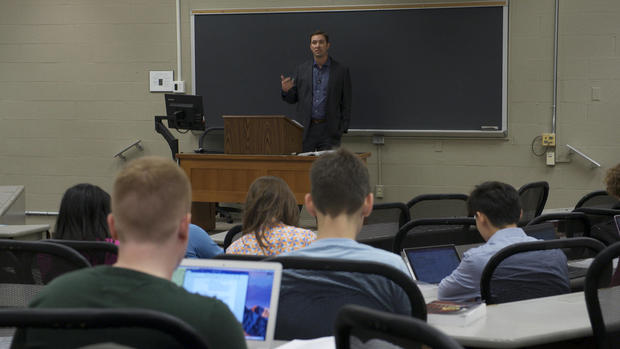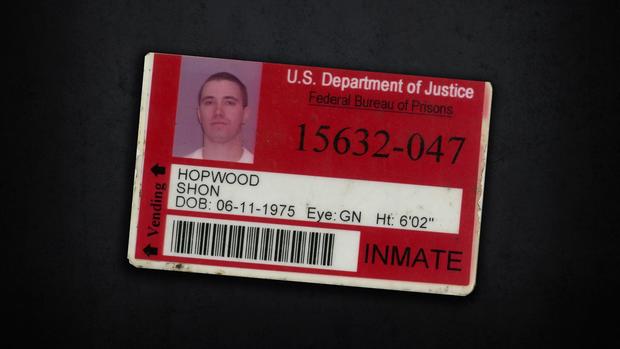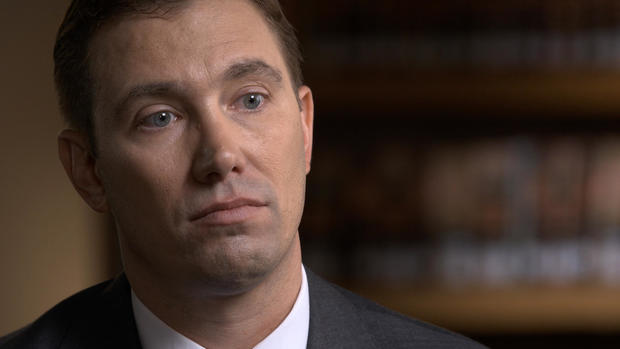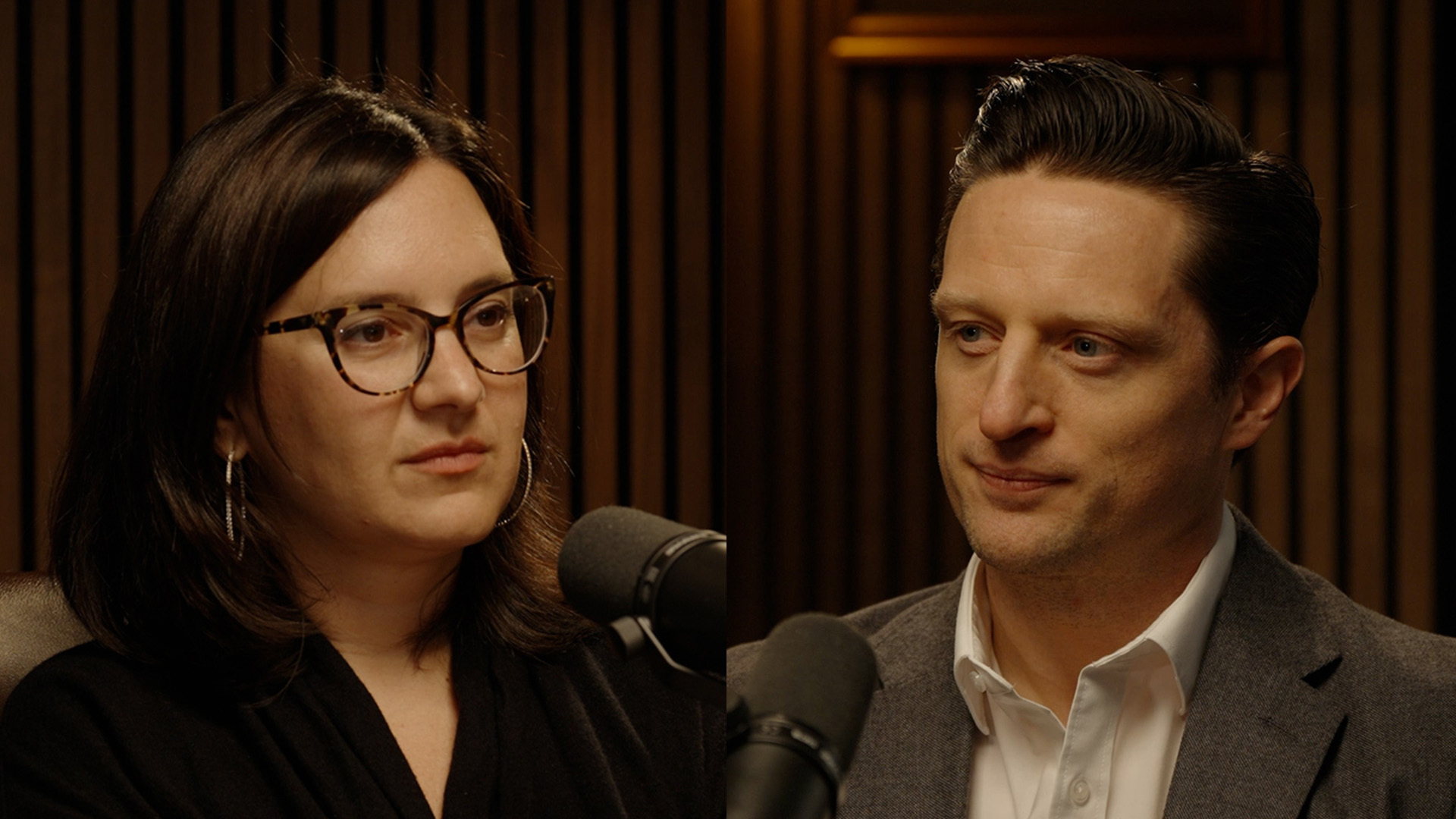Meet a convicted felon who became a Georgetown law professor
Jailhouse lawyers are prisoners who manage to learn enough about the law while incarcerated to help themselves and other inmates with legal problems. We get letters from them every week. Tonight we are going to reintroduce you to Shon Hopwood, who is arguably the most successful jailhouse lawyer ever, having had one of his cases argued before the U.S. Supreme court while serving a 12-year sentence for armed bank robbery. Since his release he's built up an extraordinary resume as a legal scholar, and has been published in top law journals. We first met him last fall at one of the nation's premier law schools where he's become its newest professor. A tale of redemption as improbable as any you're likely to hear.
Shon Hopwood: Question one is: Was there a constitutional violation?
In his first semester at Georgetown University, Professor Hopwood is teaching criminal law.
Shon Hopwood: Were the first statements unlawfully obtained? Yes.
The irony isn't lost on him or his students who know that he's a convicted felon and that less than a decade ago was an inmate at the federal correctional institution in Pekin, Illinois.
Steve Kroft: You're a professor at one of the finest law schools in the country. Is that something that you thought you would be able to do?
Shon Hopwood: No. It's-- it makes me laugh hearing you say it out loud because there are days where it doesn't make sense to me, and I've lived it. So I can see why it doesn't make sense to hardly anyone else.
"I wanted to live an exciting life. And shoveling cow manure in small-town Nebraska and living in my parents' bedroom wasn't quite cutting it."
Steve Kroft: It's easier for me to imagine you as a Georgetown law professor than it is for me to imagine you as a bank robber.
Shon Hopwood: Well, that's because the bank robber's long been dead and gone.
Hopwood was born here 42 years ago in the small farming community of David City, Nebraska, surrounded by cornfields and cattle. He was a bright, cocky, stubborn kid from a solid family and he hated rules; a good athlete and miserable student who won a basketball scholarship to Midland University and partied his way out of it in one semester. He drank himself through a two-year hitch in the Navy. Then added drugs to the mix when he returned to David City working in a feedlot.
He was broke, unrepentant and frustrated that things weren't going his way.
Shon Hopwood: I wanted to live an exciting life. And shoveling cow manure in small-town Nebraska and living in my parents' bedroom wasn't quite cutting it.
One night he got a call from a friend asking him to come down to the local bar for a drink and listen to what turned out to be a very bad idea.
Shon Hopwood: He said, "What do you think about robbing a bank?" And most people would have laughed that off or said-- "Maybe we need another beer," or anything other than, "That sounds like a great idea," which is what I ended up saying.
Steve Kroft: Really?
Shon Hopwood: You know, I don't think either one of us thought that night that we were gonna actually do it.
Steve Kroft: It sounded exciting.
Shon Hopwood: It sounded exciting. Sounded like easy money that we didn't have to work for, something that fit with where my mind was at, at the time, which was a reckless, immature, foolish 21-year-old.
It wasn't until months later when they started scouting locations that Shon realized they might actually do it.
Steve Kroft: So this is one of your banks?
Shon Hopwood: It is. This is the third bank.
The idea was to stick up very small banks in tiny towns like Gresham where there was no police presence and little risk of armed confrontation.
Shon Hopwood: We wanted to get in and out of the bank as quickly as possible, not hurt anyone, grab as much money as we could, and run. And that's basically what we did in all five bank robberies.
Steve Kroft: Were you any good at it?
Shon Hopwood: No. I did 11 years in federal prison for stealing $150,000. I don't think that's good.
Eventually the FBI put out a composite sketch and began closing in. In July 1998, he was apprehended in this Omaha hotel 10 months after his first robbery.
Shon Hopwood: When they arrested me they searched my car and found $100,000 in cash that was directly traceable to the bank I had just robbed, and multiple guns, and a scanner, and binoculars.
Steve Kroft: They had ya?
Shon Hopwood: They had me.
And they would have him for a long time. When he entered the federal penitentiary in Illinois in May of 1999, he was 23 years old.
Steve Kroft: Was it dangerous?
Shon Hopwood: Of course. In part because there's not a lot for the inmates to do.
He doesn't talk about the things that he witnessed and experienced in federal prison. He doesn't want his family to know and he sees no value in reliving them, except for the job he landed in the safety of the legal library, which every federal prison is required to have.
Shon Hopwood: And for the first six months I worked at the prison law library I didn't hardly touch the books. They were big, they were thick, they were intimidating.
Steve Kroft: What was the spark that got you to start opening the books and looking at them?
Shon Hopwood: Self-motivation.
It all started with a Supreme Court ruling that Shon thought might help him get his sentence reduced and it ended with him assisting other prisoners with all sorts of cases.
Shon Hopwood: I spent two months working on my own case, researching and I was never able to get any legal relief for myself the entire time I was in federal prison.
Steve Kroft: But you were for other inmates?
Shon Hopwood: I did. Lawyers had made really bad mistakes, and it really cost their clients sometimes, you know, a decade or two in federal prison.
Inside the walls at Pekin he won the respect of fellow inmates, and discovered that he had an aptitude for something: the law.
Shon Hopwood: I would be sitting in my cell reading a federal reporter, which is a compendium of federal court of appeals cases, and I would just read that cover-to-cover as if it was a novel, just for fun.
Steve Kroft: Was it fun?
Shon Hopwood: Oh, I think the law is fascinating.
Steve Kroft: In what way?
Shon Hopwood: It was like a big puzzle for me.
Three years into his prison term he got an opportunity to show just how much he'd learned when John Fellers, a friend and fellow inmate asked Shon to appeal his drug conviction to the highest court in the land.
Shon Hopwood: He came to me and said, "Would you take the case and would you file this petition to the Supreme Court?" I said, "No absolutely not."
Steve Kroft: Why?
Shon Hopwood: His case was very complex and I didn't think I could do it. But John was very persistent.
He would spend months working day and night on the petition. It required him to master the facts of the case, understand the statutes and legal precedents, identify the errors made by lawyers and judges in the appeal process and then craft an argument in the language of the court before mailing it off to Washington.
Steve Kroft: Did the Supreme Court know that the brief had been written by a prisoner?
Shon Hopwood: The first hint would've been the fact that it was typed on a typewriter. I don't think law firms in 2003 were using typewriters to knock out Supreme Court briefs.
Four out of nine Supreme Court justices must agree for a case to be heard. That year more than 8,000 petitions were filed, 74 were accepted, one of those was written by Shon Hopwood.
Shon Hopwood: And one morning, a friend of mine came running and screaming my name "Shon, Shon, Shon." And, what he had was a copy of the USA Today and I read the article and it said the court had granted John Fellers' case.
Steve Kroft: What went through your mind?
Shon Hopwood: I was shocked. I was shocked that the court had granted the case and that I had done something that, you know, lawyers wait their whole lives to do and done it the first time.
Seth Waxman: It's not that unusual for prisoners to file their own petitions. What is freakishly unusual is for one of those petitions to be granted.
Seth Waxman, a prominent appellate lawyer and the former solicitor general of the United States is not easily impressed. But when he was asked to argue the Fellers case before the Supreme Court, he said he would do it only if Shon Hopwood would work from prison as part of the team.
Seth Waxman: I wanted him to be involved, because I was really curious. It seemed actually almost inconceivable that somebody with his level of education and his level of exposure to the life of the law could actually write a much better than average cert petition.
Steve Kroft: So this woulda been good for a Washington lawyer?
Seth Waxman: Even for a licensed, appointed lawyer representing a federal prisoner, you would say, "Wow."
Waxman won the Fellers case before the Supreme Court in a unanimous decision, and became Shon's mentor during his final six years in prison.
Shon Hopwood: When a former solicitor general of the United States says that you did a good job writing a brief that has an impact-- especially when you're surrounded in this environment where prison guards are telling you every day that you're worthless and that you don't amount to anything.
Steve Kroft: Did you win some more cases?
Shon Hopwood: I did. I won another case on the Supreme Court, I won a case on the Sixth Circuit Court of Appeals, and I won cases-- mostly on resentencing motions for federal prisoners and federal district court cases kind of all over the country.
He found a purpose in life and when Ann Marie Metzner, who'd once had a high school crush on Shon began writing letters and paying him visits, he started to think he might have some kind of future when he got out. But he knew there were huge obstacles ahead.
Steve Kroft: Did you decide you wanted to be a lawyer while you were in prison?
Shon Hopwood: I did, but I didn't think I could. I had had countless number of lawyers tell me I could not go to law school, and even if I could I would never get licensed by any of the state bar associations, given my crimes.
When he was released to a halfway house near Omaha in 2008, he had never seen an iPhone, never been on the Internet and was computer illiterate. But as if by miracle he saw an ad for a document analyst at Cockle Legal Printing one of just a few companies in the U.S. that helps attorneys assemble briefs for the Supreme Court. Andy Cockle and his sister, Trish Billotte, remember that Shon showed up for his interview in ill-fitting clothes, with a rumpled letter from Seth Waxman and an 11-year gap in his resume.
Andy Cockle: We work with attorneys everyday, all week long that are trying to get their case granted. And none of 'em do. And this guy comes out and says I had--
Trish Billotte: Two.
Andy Cockle: Two of 'em granted. Oh yeah—
Steve Kroft: Did you believe him?
Andy Cockle: No. I thought he was delusional.
But his story checked out and they gave him the job.
Steve Kroft: You're glad you hired him.
Both: Oh yeah.
Trish Billotte: It was sad to see him go.
He spent three years with the Cockles in Omaha, completing the undergraduate degree he'd begun in prison, and continuing to impress the lawyers he worked with. With their help and against all odds the University of Washington law school took a chance on him. He won a full scholarship from the Bill and Melinda Gates Foundation and upon graduation was admitted to the bar.
Steve Kroft: How did you do in law school?
Shon Hopwood: Surprisingly well.
Steve Kroft: You were already a lawyer?
Shon Hopwood: Well, I mean, it was a new experience, doing well in school.
He did well enough to land a prestigious clerkship with the United States Court of Appeals for the District of Columbia, the second most important court in the country.
Seth Waxman: The idea that a convicted bank robber was gonna go work for Janice Rogers Brown, you know, a very conservative judge on a very important court. Surprising in the absolute sense? Yes. In the context of who Shon Hopwood is and where, what he was setting out to do, not that surprising.
A year later it led to a highly competitive teaching fellowship at Georgetown Law's Appellate Litigation Clinic, where he did so well, the faculty awarded him a position as a professor of law.
Steve Kroft: How hard is it to get a job teaching law at Georgetown?
Steven Goldblatt: It's very hard.
Professor Steven Goldblatt is the faculty director for the Supreme Court Institute at Georgetown Law.
Steven Goldblatt: To have somebody who's a credible voice who actually lived the experience, who understands what it's like to spend a day in prison, much less 11 years, is highly unusual. So I think this was a unique opportunity to get somebody for whom there are no others out there, and that the potential was enormous.
Along with his other accomplishments, Shon Hopwood also got to marry that girl from David City, Annie Metzner, who is now a law student herself. They have two children.
Steve Kroft: Are you surprised how this has turned out?
Annie Metzner: Yeah. Yeah. I had no-- no idea of what the future would hold for us. Neither one of us had any clue that this would-- all these wonderful things would happen.
Hopwood's main interest now is criminal justice reform. He is an advocate for shorter prison sentences for most crimes, and more vocational training, drug treatment and mental health counseling, which are often non-existent.
Shon Hopwood: Prison is not the place for personal growth. We warehouse people and then we kick them out into the real world with very little support and hope that a miracle happens.
Steve Kroft: But somehow, all the things stacked against you, you were able to do it?
Shon Hopwood: Yeah. It was people that helped, that went out of their way to provide grace to me. That made the difference.
Produced by Maria Gavrilovic. Michael Kaplan, associate producer.










